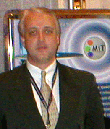|
|
This topic comprises 3 pages: 1 2 3
|
|
Author
|
Topic: Hearing-impaired get movie treat
|
Bevan Wright
Expert Film Handler

Posts: 176
From: Fountain Valley, CA, USA
Registered: Sep 2003
|
 posted 05-08-2004 08:15 AM
posted 05-08-2004 08:15 AM





Hearing-impaired get movie treat
Fri May 7, 9:40 AM ET
By Paul Singer Washington Bureau
When Clint Eastwood's "Dirty Harry" character sneered, "Go ahead--make my day," the line became such a cultural phenomenon that President Ronald Reagan (news - web sites) repeated it in daring Congress to pass a tax increase he could veto.
But John Stanton and millions of other deaf Americans did not recognize the reference. The line comes from a 1983 movie that--like virtually all other American movies released since the end of the silent film era--had no subtitles or captions for the hearing-impaired.
Now a lawsuit filed by Stanton and two other deaf moviegoers against two major movie chains may change that, paving the way for a broad expansion of captioning devices for the hearing-impaired in theaters throughout the country.
In a settlement approved by a federal judge last week, the theater chains--AMC Theaters and Loews Cineplex--agreed to install individual captioning devices in a dozen theaters in the D.C. area over the next year. They also agreed to build the system into at least one screen in all their new theater complexes in the region.
"I'm probably going to be deaf for the rest of my life," said Stanton, a Washington lawyer. "I hope I'm going to live to see the day where almost every movie is caption-accessible. ... I think our settlement is a very good starting point to get that process going."
Settlement sets new standard
U.S. District Judge Gladys Kessler approved the settlement April 30. While it applies only to the Washington area, it "will set the standard for what other communities, at a very minimum, should be offering," she said.
The deal calls for use of Rear Window captioning technology, designed to help hearing-impaired moviegoers without blocking others' view, that provides the user a transparent plastic panel attached to a seat's cup holder. The captions are displayed on the back wall of the theater, and the reflection is visible on the panel but invisible to patrons in adjoining seats.
The technology currently is available in only one movie theater in the Washington area and fewer than 100 nationwide. Six screens in the Chicago area have Rear Window technology, including the AMC City North and the AMC Yorktown in Lombard. There are no closed-caption screens elsewhere in Illinois.
An AMC spokesman said that in addition to the Washington-area court settlement, the chain has made a voluntary commitment to install Rear Window in all its new theater complexes--but not for every screen. AMC also will retrofit at least one theater in all 210 of its complexes nationwide to provide captioning technology.
Loews declined to comment on its plans.
Stanton's lawsuit argued that theaters without captions violate the Americans With Disabilities Act, which requires businesses to establish reasonable accommodations for people with disabilities.
Two other lawsuits seeking to force theaters to install captioning technology--one in Oregon, one in Texas--have failed, leaving the D.C. settlement as the first lawsuit to result in an agreement to add captioning.
"What the settlement does is provide a model that can be replicated in other communities around the country," said Todd Houston, executive director of the Alexander Graham Bell Association for the Deaf and Hard of Hearing.
David Monroe, the lawyer who negotiated the settlement on behalf of AMC and Loews, said even more captioning devices may be installed nationwide if it makes economic sense.
"If it turns out that a lot of additional people come to see captioned films, that makes it more likely that they will make more captioned films available," Monroe said.
But some advocates for the deaf are disappointed that the settlement does not go further.
"It's a drop in the bucket," said Cheryl Heppner, chairwoman of the Coalition for Movie Captioning, an alliance of advocacy groups for the deaf and hard of hearing. The coalition says the deal requires only "the ability to show captioned movies on roughly 5 percent of AMC/Loews screens forever."
Other advocates say the Rear Window system is cumbersome and that a better approach would be "open captions"--subtitles projected on the screen and visible to all patrons.
Studio and theater executives adamantly oppose that idea, saying such subtitles would be a distraction to their hearing clientele and would interfere with a director's creative control of the image on the screen.
Richard King, a spokesman for AMC Theaters, said his company has tested open captioning and "we have found that is something that is not appealing to moviegoers [who] are not hearing-impaired."
It is an open question whether there is an economic incentive for theaters to install captioning devices.
Costs $10,000 to install
The Rear Window systems cost about $10,000 to install, and King pointed out that there are no data to prove that the technology brings in flocks of deaf or hard-of-hearing patrons.
Tawny Holmes, student body president at Gallaudet University, a D.C. school for hearing-impaired students, said deaf students looking for evening activities do not immediately think of going to the movies, mostly because they don't expect to find a captioned film.
"But when there is an announcement that there is going to be a captioned movie, they go in droves," she said, speaking through a sign-language interpreter.
Studios generally produce captions for the DVD or video versions of their films, and they already produce captions for some theatrical releases at minimal cost--about $50,000 per movie, said an executive at a major Hollywood movie studio who asked that his name not be used because of potential litigation. "The cost is the same whether it's in 12 theaters or 1,200," he added.
But the executive noted that the same is not true for theater owners, for whom the $10,000 cost per auditorium makes it prohibitively expensive to install the system in all 36,000 screens across the country.
| IP: Logged
|
|
|
|
|
|
|
|
|
|
|
|
|
|
John Pytlak
Film God

Posts: 9987
From: Rochester, NY 14650-1922
Registered: Jan 2000
|
 posted 05-08-2004 03:40 PM
posted 05-08-2004 03:40 PM





The open captioned films (Tripod / In-Sight Cinema) that play in Rochester reportedly do very well. The Rochester Institute of Technology is where the National Technical Institute for the Deaf (NTID) is located, so there are many hearing-impaired in Rochester. I think the Regal Henrietta-18 shows most of the captioned films.
http://www.insightcinema.org
quote:
Who We Are
InSight Cinema is a non-profit organization dedicated to bringing the big screen movie-going experience to the 30 million deaf and hard-of-hearing (DHH) and English-as-a-second-language (ESL) audiences in the United States.
The InSight Cinema Mission:
To create awareness of the availability of Open Captioned films to the deaf, hard-of-hearing, and ESL communities.
To increase film industry awareness of the demand for Open Captioned films and of the many groups who can benefit because we are “the audience that is reading.”
To raise funding for InSight Cinema to expand its national outreach and advocacy efforts.
Current Program Summary:
InSight Cinema has created a 3-way partnership with the major studios and all major exhibitors. This 10 year-long outreach program serves a liaison between the DHH community and the major studios by increasing efforts to distribute Open Captioned prints to mainstream theatres
Currently there are 150 dedicated theatre programs in place. More than 300 captioned films have appeared in more than 500 cities in the US, with a marked increase in the number of prints bring shipped per title, with over 50 titles added to the program alone this year.
Want to help? You can participate!
There are an estimated 30 million American who have been identified with a hearing loss. Currently, there are about 35,000 movie screen in the U.S. alone, so our work has only begun.
You can show your support by signing up for our e*movie notification list that is sent to 50 states every week. Volunteer to be a Patron Advisory Board member who serves as our local “eyes and ears” in the community. Make a tax-deductible donation to InSight Cinema because every little bit helps. Increased awareness means marketing, advertising and promotional efforts. All of this takes time, resources and staff.
| IP: Logged
|
|
|
|
|
|
Joe Clark
Film Handler
Posts: 2
From: Toronto, Ontario, Canada
Registered: Apr 2004
|
 posted 05-10-2004 07:17 AM
posted 05-10-2004 07:17 AM





quote: Carl Martin
umm, you do realize that film was "open-captioned" from the git-go, right?
No, it was subtitled. I trust you can appreciate the difference. If not, try watching the movie with your ears covered. Are you sure you can really understand it? (Try it at home with your favourite foreign film. No sound, subtitles only. Perfectly understandable, right? Except you never know who's speaking, the speech is noticeably edited, and no non-speech information is rendered.) It may come as a surprise to learn that subtitled movies need to be captioned.
See, among other things, The Passion of the Hypocrites.
| IP: Logged
|
|
Carl Martin
Phenomenal Film Handler
Posts: 1424
From: Oakland, CA, USA
Registered: Feb 2002
|
 posted 05-10-2004 07:35 AM
posted 05-10-2004 07:35 AM





yes, i do know there's a difference, but i still think this film in particular would be quite intelligible to a deaf person. in most key scenes, the speaker is very clearly the focus of the shot. i do remember that in some scenes, like j.c.'s apprehension near the start, i couldn't discern exactly who was speaking all the time. but overall, i got the gist. it would have been funny to see that "telephone ringing" glyph pop up.
i've seen many subtitled italian films where the original soundtrack is so poorly recorded and synced that, in alternating between reading the text and looking at the image, i failed to pick up what little cues were given as to who was speaking. it is indeed frustrating.
carl
| IP: Logged
|
|
|
|
|
|
|
|
|
|
All times are Central (GMT -6:00)
|
This topic comprises 3 pages: 1 2 3
|
Powered by Infopop Corporation
UBB.classicTM
6.3.1.2
The Film-Tech Forums are designed for various members related to the cinema industry to express their opinions, viewpoints and testimonials on various products, services and events based upon speculation, personal knowledge and factual information through use, therefore all views represented here allow no liability upon the publishers of this web site and the owners of said views assume no liability for any ill will resulting from these postings. The posts made here are for educational as well as entertainment purposes and as such anyone viewing this portion of the website must accept these views as statements of the author of that opinion
and agrees to release the authors from any and all liability.
|

 Home
Home
 Products
Products
 Store
Store
 Forum
Forum
 Warehouse
Warehouse
 Contact Us
Contact Us




 Printer-friendly view of this topic
Printer-friendly view of this topic










![[Smile]](smile.gif)
![[Confused]](confused.gif)






